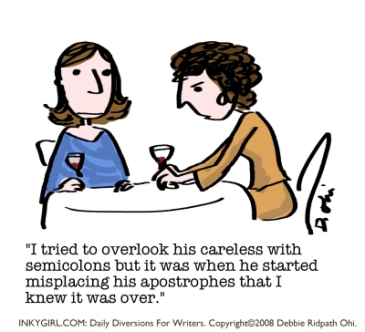
My philosophy is simple: Stick to the facts. If in doubt, leave it out!
Avoid abbreviations! They are unprofessional and not universally accepted. Trust me; nothing looks worse on a resume than seeing sentences resembling the following: “duties included answering the fone and going 2 c clients.” This is a resume, not a text message. Make sure you use correct words and proper sentences.
Leave off anything related to hobbies or personal interests. If it doesn’t relate to employment it doesn’t belong on a resume. Information such as weight and height is irrelevant (unless of course you’re trying out for basketball team). I have seen resumes where people include their eye colour and comments about their skin (“glowing skin”). Do not give the reader a reason to eliminate you because of your personal characteristics. Again, stick to the formula – if it does not relate to the job it doesn’t belong on the resume.
People feel that in order to be noticed they need their resume to look like a piece of artwork. This perception is wrong and has the opposite effect of appearing unprofessional and amateur. At the end of the day, the employer only wants to see skills, duties, and achievements. He or she is not interested because your resume is shaded yellow with a butterfly in the top right-hand corner.
Never, never, never be negative on your resume or cover letter (and most importantly, in your interview). If you left your previous job because you hated your boss, keep it to yourself. Do not try to explain this on your resume because you cannot explain those reasons in writing. Remember, a resume’s job is to promote and sell. Do not get eliminated immediately for being negative.
DO NOT MAKE THE READER HAVE TO GUESS! This is such a killer on any resume. INCLUDE DATES. What years did you go to high school? How long did you go to university? When did you graduate? How long did you work at your current job?
Do not make the person reading your resume have to ask these questions. The minute this happens, your resume is going to one place—the trash bin! Make sure your resume flows and you have no gaps in your dates. If you took a year off to go travelling, include this. When you include dates DO NOT just include years. For example, “I worked at McDonalds from 2006-2008”– what does this mean? Did you work for 3 from January 2006 to December 2008, or for a little over 1 year from December 2006 to January 2008.
Long long long long long resumes are boring!!!! If an employer sees an extremely long resume, they will immediately develop a negative frame of mind. Remember, resume readers tend to have little patience, especially when they need to read 100 resumes. You do not gain extra brownie points for writing the longest resume—enough said!
I never understand how people get this wrong, but so many times people fill up their resumes with irrelevant information, and they leave off the most vital part of a resume—showing off your highlights and achievements. Think about it—most people who apply for the same job can all do the standard day to day duties. So what separates the good resume from the bad resume? It’s the one that includes achievements and highlights. It includes how they were an asset at their previous job. Employers want to see not that you just worked and did a good job, but that you added value to the company. Leaving off your achievements is the best way to get your resume tossed in the bin. Alternatively, including value-added achievements is the best way to get your resume put on the top of the list.
Everyone is proud of achievements they have accomplished throughout their life. Finishing second place in the 100 metre sprint final in my first year of high school was a great thrill, but is it relevant on my resume? Does it add value to it? Use common sense when including “extra information.” Receiving your CPR certificate is relevant when you’re applying for a job that requires this, such as a lifesaver or swimming instructor. It isn’t so relevant if you received your CPR certificate 10 years ago, and now you’re going for a job as a CEO.
People read this point and think, “Obviously my resume isn’t going to have spelling mistakes and typos.” I can tell you from experience that 1 in 5 resumes will make this vital mistake. When an employer has 100 resumes, the first 20 are eliminated because of grammar mistakes or typos. These mistakes are glaringly obvious on a resume. Make sure you use spell-check, but more importantly, re-read your resume. Even give it to someone else to read over.
You may think that using words such as “meticulous,” “scrupulous” or “industrious” to describe yourself may make you sound smart, unfortunately they can have the opposite effect. Your resume is a representation of you. Don’t forget this!
Do you have a friend, partner or family member who is currently job seeking?
Help them find success with a RedStarResume Gift Voucher!